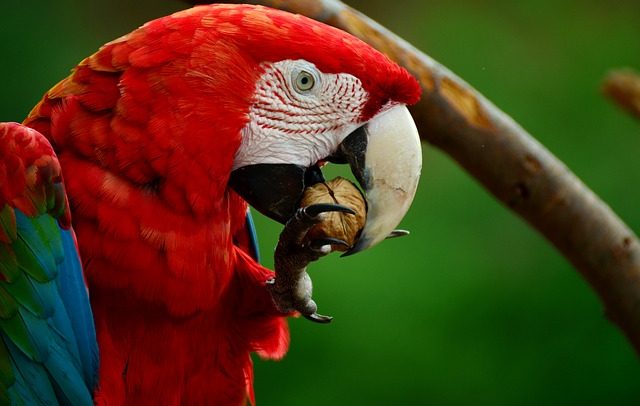Can Parrots Eat

Parrots are delightful companions known for their vibrant plumage, engaging personalities, and remarkable intelligence. As a responsible parrot owner, one of your primary concerns is ensuring your feathered friend maintains a healthy diet. While commercial parrot food is widely available, many owners wonder: Can parrots eat certain human foods? The answer is both simple and nuanced, depending on the specific food in question.
Understanding a Parrot's Dietary Needs
Parrots are omnivores, which means they can consume a variety of foods, including fruits, vegetables, nuts, seeds, and, occasionally, proteins. However, their diet must be carefully balanced to prevent nutritional deficiencies or toxicity. A healthy parrot diet should consist of approximately 60-70% high-quality pellets, 20-30% fresh fruits and vegetables, and 10% treats such as nuts or seeds.
Key Nutrients for Parrots
To thrive, parrots require specific nutrients, including:
- Protein: Essential for muscle development and repair.
- Calcium: Crucial for strong bones and eggshell production in breeding females.
- Vitamin A: Supports immune health and vibrant feathers.
- Fiber: Aids in digestion and prevents obesity.
Foods Parrots Can Safely Eat
Parrots can enjoy a wide range of fruits, vegetables, and other human foods. Below, we explore some of the best options:
Fruits
Fruits are a natural part of many parrots' diets in the wild. However, they should be fed in moderation due to their high sugar content. Here are some safe options:
- Apples (remove seeds): Rich in fiber and vitamin C.
- Berries: Blueberries, strawberries, and raspberries are antioxidant powerhouses.
- Bananas: A soft, easily digestible treat loaded with potassium.
- Papaya and Mango: Tropical fruits that provide vitamin A and digestive enzymes.
- Pineapple: Offers bromelain, a natural anti-inflammatory compound.
Vegetables
Vegetables are low in calories and high in essential nutrients, making them ideal for daily feeding. Some excellent choices include:
- Carrots: Packed with beta-carotene, a precursor to vitamin A.
- Broccoli: A cruciferous vegetable rich in calcium and antioxidants.
- Spinach (in moderation): High in iron but contains oxalates that may interfere with calcium absorption.
- Sweet Potatoes: A great source of fiber, vitamin A, and potassium.
- Bell Peppers: Vibrant, crunchy, and loaded with vitamin C.
Nuts and Seeds
While nuts and seeds are calorie-dense, they are also a valuable source of healthy fats and proteins. Safe options include:
- Almonds (unsalted, raw): Rich in vitamin E and magnesium.
- Walnuts: Contain omega-3 fatty acids that support brain health.
- Sunflower Seeds (as a treat): High in fat but a favorite among parrots.
Proteins
Parrots can occasionally benefit from protein sources like:
- Boiled Eggs: Provide amino acids essential for muscle health.
- Cooked Legumes: Lentils, chickpeas, and black beans are protein-packed and fiber-rich.
- Cooked Chicken (unseasoned): Can be offered sparingly as a treat.
Foods to Avoid: What Parrots Should Never Eat
While parrots can enjoy a wide range of foods, some items are harmful or even deadly. Always avoid feeding your parrot the following:
Toxic Foods
- Chocolate: Contains theobromine, which is highly toxic to birds.
- Avocado: The pit, skin, and flesh contain persin, a fungicidal toxin.
- Onions and Garlic: Can cause hemolytic anemia in parrots.
- Caffeine: Found in coffee, tea, and energy drinks, it overstimulates the heart.
- Alcohol: Extremely harmful to a parrot’s liver and nervous system.
Foods with Choking or Toxic Hazards
- Apple Seeds: Contain trace amounts of cyanide.
- Pits of Fruits: Such as cherries, peaches, and plums, which are toxic.
- Raw Beans: Contain lectins that can be fatal.
Junk Food and Processed Snacks
Avoid foods high in salt, sugar, and artificial additives, such as:
- Chips and pretzels
- Candy and chocolate
- Fast food
Tips for Feeding Your Parrot
To ensure your parrot remains healthy and happy, follow these feeding guidelines:
1. Wash All Produce
Always wash fruits and vegetables thoroughly to remove pesticides and bacteria. Opt for organic produce when possible.
2. Serve in Appropriate Portions
Cut food into small, manageable pieces to prevent choking. Introduce new foods gradually to monitor for allergies or adverse reactions.
3. Maintain Variety
A diverse diet ensures your parrot receives all necessary nutrients. Rotate food items to keep your bird engaged and curious.
4. Avoid Overfeeding
Parrots can be prone to obesity. Stick to recommended portion sizes and limit high-fat treats.
5. Provide Fresh Water
Ensure your parrot has access to clean, fresh water at all times. Change the water daily to prevent contamination.
Common Questions About Parrot Diets
Can Parrots Eat Bread?
Yes, but only in moderation. Choose whole-grain, unsweetened bread without additives. Avoid white bread, as it offers little nutritional value.
Can Parrots Eat Rice?
Yes, cooked rice (brown or white) is safe and provides energy. However, avoid adding salt or seasonings.
Can Parrots Eat Cheese?
While parrots can tolerate small amounts of cheese, it is not recommended due to its high fat and lactose content.
Can Parrots Eat Grapes?
Yes, grapes are safe but should be offered sparingly due to their high sugar content.
Can Parrots Eat Peanut Butter?
Yes, as long as it is natural, unsweetened, and unsalted. Spread it thinly on a cracker or fruit slice.
Feeding your parrot a balanced diet is one of the most important aspects of their care. By understanding which foods are safe and beneficial, you can ensure your feathered friend lives a long, healthy, and vibrant life. Remember, moderation and variety are key to preventing dietary imbalances and keeping your parrot engaged during mealtime.
When in doubt, consult an avian veterinarian to create a tailored diet plan for your parrot. Your efforts to provide a nutritious and safe diet will be rewarded with a happy, thriving companion.